Three NERDS were promoted from Assistant Professor to Associate Professor as of today, Oct 1: Michele Coscia, Roberta Sinatra, Michael Szell
That’s all 🙂

Three NERDS were promoted from Assistant Professor to Associate Professor as of today, Oct 1: Michele Coscia, Roberta Sinatra, Michael Szell
That’s all 🙂
Over the summer our research group, and many others at ITU, moved to a new office space, taking over a building from DR, the national Danish Broadcasting Corporation. We NERDS secured a fancy new room housing all our members, which we have started to utilize and develop after the lockdown.
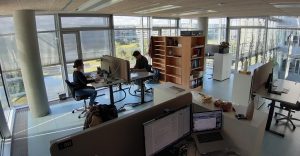
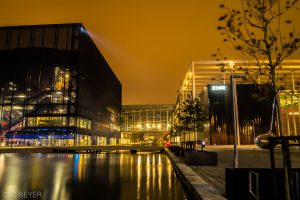
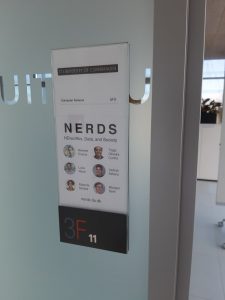
Our room and new address is:
3F11, Kaj Munks Vej 9, DR P4 building (a.k.a. Emil Holms Kanal)
After entering the building, take the elevators on the right. On the 3rd floor go left to the end of the hallway. See you!
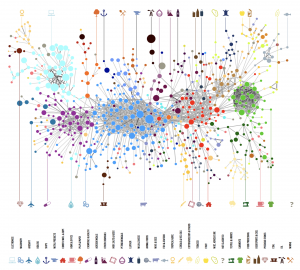 We think it is important to lift people out of poverty and to guarantee them decent standards of living. However, to successfully promote economic growth, the high degree of complexity of the global market and regional industrial activities requires an integrated understanding of the ecosystem of complementary actors, knowhow, and capital. The way to do so is by conceptualizing productivity as an emerging property of a complex system made by simpler interacting parts. Complex systems are notoriously difficult to control but quantifying these interactions can identify the bottlenecks to growth and inform policy to bolster economic convergence. Using tools from economics, complex systems, and network science, we seek crucial insights that enable economic convergence.
We think it is important to lift people out of poverty and to guarantee them decent standards of living. However, to successfully promote economic growth, the high degree of complexity of the global market and regional industrial activities requires an integrated understanding of the ecosystem of complementary actors, knowhow, and capital. The way to do so is by conceptualizing productivity as an emerging property of a complex system made by simpler interacting parts. Complex systems are notoriously difficult to control but quantifying these interactions can identify the bottlenecks to growth and inform policy to bolster economic convergence. Using tools from economics, complex systems, and network science, we seek crucial insights that enable economic convergence.
The goal of this Research Topic is to collect contributions using complex network analysis to model economic systems and to gain insights into economic development which has proven to be a valuable scientific undertaking. We want to explore the potential applications of complex network analysis to foster our understanding of complex economic systems. We welcome contributions in the broad areas of:
• Mapping the relationship of complex economic activities to build Product and Industry Spaces at the global, regional, and local level;
• Tracking flows of knowhow in all its forms (business travels, social interrelationships between entrepreneurs, etc);
• Creating networks of related tasks and skills to estimate knockoff effects and productivity gains of automation;
• Investigating the dynamics of innovation via analysis of patents and inventions;
• Uncovering scaling laws and other growth trends able to describe the systemic increase in complexity of activities due to agglomeration, e.g. in cities;
• In general, any application of network analysis that can be used to further our understanding of economics.
We have published four new papers over the summer:
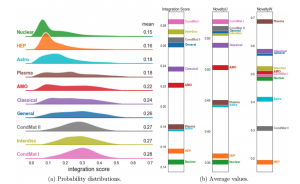
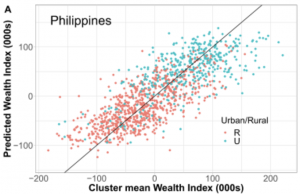
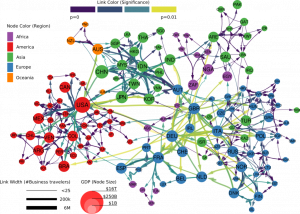
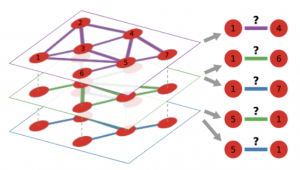
We are happy to announce that Vedran Sekara has joined NERDS!
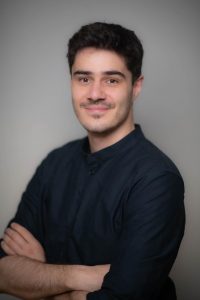 Vedran is a well-rounded scientist with a professional background from tech, academia, and the international development sector, starting at ITU as Assistant Professor. His work lies in the intersection between network science, ethics and computer science, harnessing the power of complex networks, massive datasets, machine learning and data visualization for public good. Vedran joined from UNICEF where he was a Principal Researcher focused on understanding how modern technologies, such as Machine Learning and Artificial Intelligence, impact our societies and its most vulnerable communities. His previous work has been covered in The Ecomomist, Forbes, Scientific American, and Die Zeit, and been featured on the cover of the Proceedings of the Natural Academy of Sciences.
Vedran is a well-rounded scientist with a professional background from tech, academia, and the international development sector, starting at ITU as Assistant Professor. His work lies in the intersection between network science, ethics and computer science, harnessing the power of complex networks, massive datasets, machine learning and data visualization for public good. Vedran joined from UNICEF where he was a Principal Researcher focused on understanding how modern technologies, such as Machine Learning and Artificial Intelligence, impact our societies and its most vulnerable communities. His previous work has been covered in The Ecomomist, Forbes, Scientific American, and Die Zeit, and been featured on the cover of the Proceedings of the Natural Academy of Sciences.
At ITU Vedran plans to continue this stream of work by leveraging data from private, humanitarian and international sectors to understand data representativeness, algorithmic bias, and how to build equitable algorithms. We are super excited about all the ways Vedran will enrich our group, on both a social and professional level!
On June 11th, virtually in front of the Examination Committee – headed by Barbara Plank (IT University of Copenhagen) and with members Vito Latora (Queen Mary University of London) and Luca Aiello (Nokia Bell Labs) – Obaida Hanteer successfully defended his PhD.
Well done!
Obaida’s research took first a practical approach to community detection in the context of multilayer networks (mainly working with social media data [, ]) and then, it stepped back and looked with a critical eye at the tools and the (often implicit) assumptions made by multilayer community detection methods [, ]. His research, as acknowledged by the committee, was brave – in challenging the status quo and the assumptions of many well-established methods – and compelling helping us remembering the importance of asking questions about the tools and the methods we use.
After his experience at ITU Obaida accepted another interdisciplinary challenge by joining the Novo Nordisk Foundation – where he’ll be working on applying multi-layer networks concepts to the interactions of human’s gut microbiome. We wish Obaida all the best for his future career!
NERDS are back from the lockdown with two three new papers published today:
Distortions of political bias in crowdsourced misinformation flagging, by Michele Coscia and Luca Rossi, published in the Journal of the Royal Society Interface
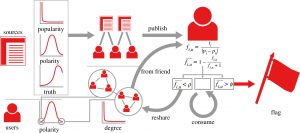
Luca writes more about the paper here: https://blogit.itu.dk/lucarossi/2020/06/10/reasonable-wrong-technical-solutions-to-social-problems/
And here Michele’s take: http://www.michelecoscia.com/?p=1816
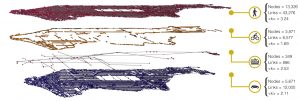
Update June 11th: Make that one more:
3. Generalized Euclidean Measure to Estimate Network Distances, by Michele Coscia, published in ICWSM-2020
We welcome our first Postdoc, Tiago Oliveira Cunha!
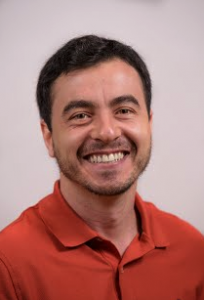 Tiago is a thriving computer scientist joining us from University of Michigan. He is interested in success and health issues online, and he has both research and industry experience. At NERDS, Tiago will research social dynamics and success using his expertise in computational social science, data mining, machine learning, social network analysis, and health informatics.
Tiago is a thriving computer scientist joining us from University of Michigan. He is interested in success and health issues online, and he has both research and industry experience. At NERDS, Tiago will research social dynamics and success using his expertise in computational social science, data mining, machine learning, social network analysis, and health informatics.
This friday he will give an introductory seminar to his research from 12:15-13:00 in the 4E wing, titled: Are All Successful Communities Alike? Characterizing and Predicting the Success of Online Communities.
Link to event: https://nerds.itu.dk/event/lunch-seminar-tiago-oliveira-cunha/
We have founded NERDS exactly 6 months ago to be a reference point at ITU for the research on network and data science applications to social systems. At 6 months old, we have already learned to sit up, to roll both ways, and soon we expect to crawl and also grow some teeth. More of our achievements so far:
What does the future hold?
Our long-term goal is 1) to build up a flourishing network of Denmark-based network/data science research groups, connecting ITU, KU, DTU, and others, 2) continue active collaboration with funding agencies and public stakeholders to solve societal problems with our research, and to further convey its importance to help us grow faster.
Live long and prosper 🖖
Roberta, Michael, Michele, Luca
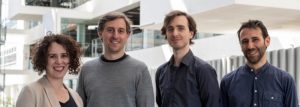
Luca and I have published a paper on the ASONAM conference — happening this week. In it, we discuss the effects of performing a projection from a bipartite to a unipartite network, and then filtering the edges according to some way to find statistically significant thresholds. You can read more details on my blog: http://www.michelecoscia.com/?p=1699